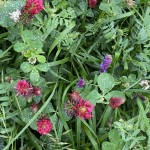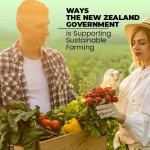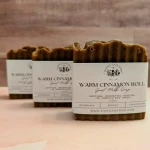Meet Future Farming Trustee Scott Lawson
Scott puts improving soil health as the highest farming priority.
Added 2 years ago
By Brenda Newth

In this interview, Scott describes his farming background and reasons for involvement with the HB Future Farming Trust.
Scott, what is your background?
I’m Hawke’s Bay born and raised, in the Twyford growing area. As a youngster in my school days I was working on the family farm, raising fruit and vegetables, and then grapes. I think my seventh form year or most of it, I spent leasing land and growing export squash. I did that before and after school, with school commitments coming first, of course!
After my schooling, I went and trained as a diesel mechanic, furthering my interest in machinery. I did that for a brief time, and soon after (in the mid 1980s) I went overseas on my OE.
During that time I went farming in Scotland through a contact of a friend, and then construction work, and stone fixing, and building work in London for a few years. I ended up managing a labour agency in London (with a focus on the construction industry), and had 75 staff on lots of different building sites all around London.
Do you farm, if so, what?
I came back to New Zealand in 1990 and studied forestry for a couple of years. I also got involved in squash growing, in a partnership business and managed a squash export packhouse for a few years and then got involved with the family business again, in partnership with my brother and father. We all have different skill sets that we could offer the business. My Dad was never a farmer. He was management accountant, a businessman actually.
Over the last 30 years I’ve been growing organically. It was encouragement from the Japanese fresh market squash supply that got me into it. They wanted safe food and they saw that getting BioGro certified food was one way the Japanese customers could be assured of safe food. So we started some conversion to BioGro organics and it grew from there with a lot of encouragement from Heinz Wattie’s those days. Wattie’s had a big push in organics in the 90s.
In recent years, we've divested of and downsized our businesses for various reasons including lifestyle, and now we are just doing blueberries.
What got you involved in the Future Farming Trust?
Over the last 20 plus years, I've been involved with different interest groups on soil quality and soil carbon, and soil management practices, including groups like LandWISE and many other groups concerned about the sustainability of our finite resources. So that sort of led to many discussions years ago with scientists about soil carbon management practices, on-farm techniques, those sorts of things.
And I was lucky enough as a vegetable grower to be able to put that stuff into practice. Because as a regular sower, cultivator and harvester of crops on a fragile soils, that's when you can make a difference.
We talk about reducing our footprint. So you can reduce your impact on the soil if you're wise in the way that you manage your farming and growing practices with machinery and cover crops and the likes. So that led me to a lifelong interest in soil quality, and soil nutrition, producing healthy food for our community. And that's very relevant today, I believe.
As a practitioner, you can see that when you do trials, and you practice different methodologies, you can see what works for you and what doesn't work. So that led me into a group of discussions with like-minded people, and probably five or six years prior to the Trust being formed many of us were meeting regularly and talking about the farming future of Hawke's Bay and what we could do individually and collectively to help Hawke’s Bay food production systems for our community. That led to some seed funding from the Regional Council and the formation of our Trust.
What part do you think the Trust can play in the success of our primary sector in the Bay?
Well, we have so many challenges, and it's always a hard one to pinpoint. But for me, it's just about ensuring that the health of Hawke's Bay's environment, soils, and people are at the forefront of everybody's minds. It's very much about finding the balance on-farm because our focus area with the Trust is actually on-farm practices and finding that balance between the economics and the environmental challenges and opportunities. It's weighing up those pros and cons all the time.
The Trust is trying to champion the work (of the rural community) and reducing the urban/ rural divide as well. For people to recognise where their food comes from and to source locally grown food if they wish to, and if they have access to it.
We don't want to see any productive land go into concrete. We appreciate that we all have to build roads and have some coolstore infrastructure etc, but it’s the right buildings in the right place. And maintaining effective resource management and resource protection.
What are the biggest issues farmers are facing and how can the Future Farming Trust help?
There are lots of issues facing farmers, but I would say some key issues are profitability, economic viability and environmental sustainability. And we need to be able to practice regenerative farming practices, not degenerative, while still maintaining profitable businesses. That's a big challenge.
I think the hardest part for any primary producer is getting a fair price for their produce, and having recognition from the consumer of the hard work and risk that's gone into producing – whether that be a broccoli or a shoulder of lamb, or a beef steak. There’s so much goes into it that people don't realise. I think now we're seeing less expendable income being spent on food each week – generationally that’s reducing. Do we wish to support purchasing good food, or do we wish to spend on foreign travel, or foreign luxury items, or otherwise?
The Trust has a role to play in supporting economic viability and environmental sustainability. We’re focused on on-farm change. As Trustees we have constraints on the amount of effort and time that we can put into the Trust, and we need to involve more people in the Trust from the wider community, not just farmers. We've been very lucky to have achieved some great sponsorship and foundation partners.
It's also about building on-farm resilience. And that comes about in the economics of the businesses, the staff and the business owners’ own personal resilience to the pressures of climate change, regulatory requirements, consumer expectations, and the finite resources that that we all live with.
Soil carbon is a very hot topic at the moment. But we need to focus on just looking after our soils – even if we achieve very little financial reward for soil sequestration, we would see fantastic increases in production, in quality of the food we produce, and in the resilience we would build into our farms with increased soil carbon levels.
Join the conversation
Be the first to leave a comment.
Leave a comment
All comments are reviewed before they are published on the website. Your email address will not be published.




Family-Owned Farm Embraces Regenerative Agriculture to Grow and Educate


